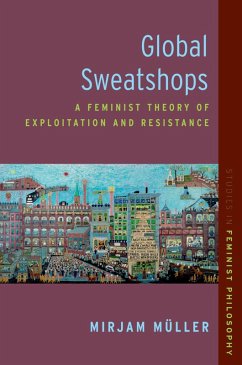Hinweis: Dieser Artikel kann nur an eine deutsche Lieferadresse ausgeliefert werden.
Bitte wählen Sie Ihr Anliegen aus.
Rechnungen
Retourenschein anfordern
Bestellstatus
Storno
Sweatshop labour is characterized by low wages, long hours, and systematic health and safety hazards. Most of the workers in the sweatshops of the garment industry are women, many of them migrant women. This book develops an intersectional feminist critique of the working conditions in sweatshops by analysing the role of gender, race, and migration status in bringing about and justifying the exploitation of workers on factory floors. Based on this analysis, the book argues that sweatshop workers are structurally vulnerable to exploitation in virtue of their position as gendered, racialized,…mehr







Es gelten unsere Allgemeinen Geschäftsbedingungen: www.buecher.de/agb
Impressum
www.buecher.de ist ein Internetauftritt der buecher.de internetstores GmbH
Geschäftsführung: Monica Sawhney | Roland Kölbl | Günter Hilger
Sitz der Gesellschaft: Batheyer Straße 115 - 117, 58099 Hagen
Postanschrift: Bürgermeister-Wegele-Str. 12, 86167 Augsburg
Amtsgericht Hagen HRB 13257
Steuernummer: 321/5800/1497
USt-IdNr: DE450055826
Bitte wählen Sie Ihr Anliegen aus.
Rechnungen
Retourenschein anfordern
Bestellstatus
Storno
Sollte Ihr Anliegen nicht dabei sein, finden Sie weitere Auskünfte zu Ihren Fragen auf unseren Serviceseiten.
Serviceseiten
Schließen
Wir verwenden Cookies und ähnliche Techniken, um unsere Website für Sie optimal zu gestalten und Ihr Nutzererlebnis fortlaufend zu verbessern. Ihre Einwilligung durch Klicken auf „Alle Cookies akzeptieren“ können Sie jederzeit widerrufen oder anpassen. Bei „Nur notwendige Cookies“ werden die eingesetzten Techniken, mit Ausnahme derer, die für den Betrieb der Seite unerlässlich sind, nicht aktiviert. Um mehr zu erfahren, lesen Sie bitte unsere Datenschutzerklärung.
Notwendige Cookies ermöglichen die Grundfunktionen einer Website (z. B. Seitennavigation). Sie können nicht deaktiviert werden, da eine technische Notwendigkeit besteht.
Dieser Service wird für die grundlegende technische Funktionalität von buecher.de benötigt.
Zweck: Notwendige
Dieser Service wird für die grundlegende technische Funktionalität von Google-Diensten wie z.B. reCaptcha benötigt.
Zweck: Notwendige
Dieser Service wird für die grundlegende technische Funktionalität von Klaro der Cookie-Zustimmung benötigt.
Zweck: Notwendige
Funktionale Cookies sorgen für ein komfortables Nutzererlebnis und speichern z. B. ob Sie eingeloggt bleiben möchten. Diese Arten von Cookies dienen der „Wiedererkennung“, wenn Sie unsere Website besuchen.
Dieser Service wird für die erweiterte Funktionalität von buecher.de verwendet.
Zweck: Funktionale
Dieser Service wird verwendet, um eine sichere Anmeldung bei Google-Diensten zu ermöglichen und Ihre Sitzung zu verwalten.
Zweck: Funktionale
Personalisierung ermöglicht es uns, Inhalte und Anzeigen basierend auf Ihren Interessen und Ihrem Verhalten anzupassen. Dies umfasst die Anpassung von Empfehlungen und anderen Inhalten, um Ihre Erfahrung auf unserer Website zu verbessern.
Dieser Service wird für die Personalisierung der Besucher von buecher.de verwendet.
Zweck: Personalisierung
Wir nutzen Marketing Cookies, um die Relevanz unserer Seiten und der darauf gezeigten Werbung für Sie zu erhöhen und auf Ihre Interessen abzustimmen. Zu diesem Zweck teilen wir die Daten auch mit Drittanbietern.
Dieser Service wird für die Personalisierung von Werbung auf buecher.de verwendet.
Zweck: Marketing
Dieser Service wird genutzt, um zu erfassen, ob Sie über einen Partner aus dem Adtraction-Netzwerk zu uns gelangt sind. Damit kann die Vermittlung korrekt nachvollzogen und abgerechnet werden.
Zweck: Marketing
Dieser Service wird genutzt, um nachzuvollziehen, über welche Partner-Website Sie zu uns gelangt sind. Dadurch können wir sicherstellen, dass Partner für vermittelte Verkäufe korrekt vergütet werden.
Zweck: Marketing
Dieser Service wird genutzt, um zu erfassen, ob Sie über das Preisvergleichsportal billiger.de zu uns gelangt sind. Damit kann die Vermittlung korrekt nachvollzogen und abgerechnet werden.
Zweck: Marketing
Bing ist ein Werbedienst von Microsoft, der es ermöglicht, Werbung auf anderen Websites anzuzeigen. Dabei können personenbezogene Daten wie Nutzungsdaten verarbeitet werden.
Zweck: Marketing
Dieser Service wird genutzt, um personalisierte Produktempfehlungen und Werbung basierend auf Ihrem Surfverhalten bereitzustellen.
Zweck: Marketing
Criteo ist ein Retargeting-Dienst, der es ermöglicht, personalisierte Werbung auf anderen Websites anzuzeigen. Dabei können personenbezogene Daten wie Nutzungsdaten verarbeitet werden.
Zweck: Marketing
Facebook ist ein soziales Netzwerk, das es ermöglicht, mit anderen Nutzern zu kommunizieren und verschiedene Inhalte zu teilen. Dabei können personenbezogene Daten wie Nutzungsdaten verarbeitet werden.
Zweck: Marketing
Getback ist ein Retargeting-Dienst, der es ermöglicht, personalisierte Werbung auf anderen Websites anzuzeigen. Dabei können personenbezogene Daten wie Nutzungsdaten verarbeitet werden.
Zweck: Marketing
Google Ads ist ein Werbedienst von Google, der es ermöglicht, Werbung auf anderen Websites anzuzeigen. Dabei können personenbezogene Daten wie Nutzungsdaten verarbeitet werden.
Zweck: Marketing
Google Analytics ist ein Webanalysedienst, der von Google zur Erhebung von Nutzungsdaten verwendet wird. Diese Daten ermöglichen uns, unsere Website zu optimieren und Ihnen den bestmöglichen Service zu bieten.
Zweck: Marketing
Dieser Service wird genutzt, um personalisierte Werbung anzuzeigen. Dadurch können wir Ihnen relevante Angebote und Empfehlungen bereitstellen.
Zweck: Marketing
Dieser Service wird genutzt, um personalisierte Inhalte und gesponserte Empfehlungen bereitzustellen, die auf Ihrem bisherigen Nutzungsverhalten basieren.
Zweck: Marketing
RTB House ist ein Retargeting-Dienst, der es ermöglicht, personalisierte Werbung auf anderen Websites anzuzeigen. Dabei können personenbezogene Daten wie Nutzungsdaten verarbeitet werden. Weitere Informationen finden Sie in der RTB House-Datenschutzerklärung.
Zweck: Marketing
Dieser Service wird genutzt, um nachvollziehen zu können, über welchen Partner Sie auf unsere Website gelangt sind. So kann die Vergütung von Partnern bei erfolgreichen Vermittlungen korrekt erfolgen.
Zweck: Marketing
Xandr ist ein Werbedienst von AT&T, der es ermöglicht, Werbung auf anderen Websites anzuzeigen. Dabei können personenbezogene Daten wie Nutzungsdaten verarbeitet werden.
Zweck: Marketing
Mit diesem Schalter können Sie alle Dienste aktivieren oder deaktivieren.
